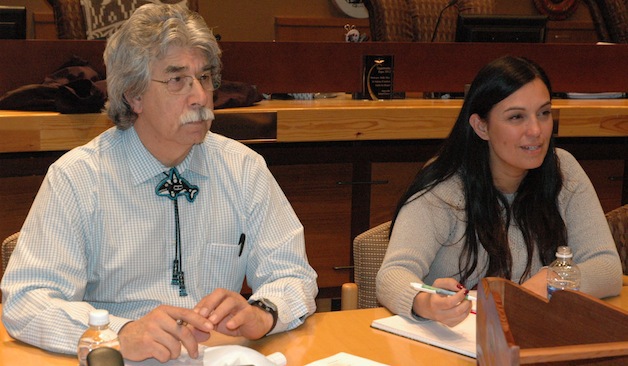
— image credit: Kirk Boxleitner
By Kirk Boxleitner, Marysville Globe
TULALIP — Shoring up the struggling students of the Marysville School District was a recurring theme among the many and varied subjects discussed during the Monday, Feb. 24, joint meeting of the respective boards of directors of the Marysville School District and the Tulalip Tribes.
Marysville School Board Vice President Chris Nation touted incoming interim special education services directors Dave Gow and Dr. Bob Gose as experienced professionals who have successfully turned around other school districts’ special education programs.
“I don’t know how much they’ll be able to fix in six months, but they can develop the department so that pieces will be in place for our new permanent directors,” Nation said.
“We’re also elevating those positions to executive directors, so they’ll be part of the district’s cabinet,” MSD Superintendent Dr. Becky Berg said.
“Our concern is, what can we be doing to offer more services to these students?” Tulalip Tribal Board Chair Mel Sheldon Jr. asked.
“The systems we had in place were not making effective use of all of our partnerships,” Nation said.
Berg’s coffees with community members were cited by members of both boards as a successful venue for allowing parents to discuss their concerns in a more informal setting.
MSD Assistant Superintendent Ray Houser followed this conversation by reporting that Quil Ceda/Tulalip Elementary has been designated as a Required Action District by the state Office of Superintendent of Public Instruction.
“As hard as those students have worked, because of where they began, they’re still not at standard,” said Houser, who pointed out the silver lining of continued resources for the school, whose school improvement grants are set to wrap up. “We’re moving from federal to state money.”
Houser and Berg reassured those in attendance that the school staff who guided the students through such significant growth in recent years would not be the subject of turnovers.
“This allows us to build on our successes,” Berg said of the RAD designation.
Anthony Craig and Kristin DeWitte, co-principals of Quil Ceda/Tulalip Elementary, identified the merged school’s three focus points as academics, behavior and cultural heritage.
“A lot of schools that were recipients of those improvement grants came up with strategies to bump up their scores in the short term, and we could have done the same,” Craig said. “The problem would have been that we wouldn’t have had any real reforms after the money went away in three years.”
“What role can the parents play in all of this?” Sheldon asked.
“We’re looking at a lot more family engagement,” Craig said. “A lot of our parent/teacher conferences have 100 percent attendance now. That’s what it means to own a school. We want our students to be able to tell their parents about their own positive experiences at school, and about how someone believes in them.”
